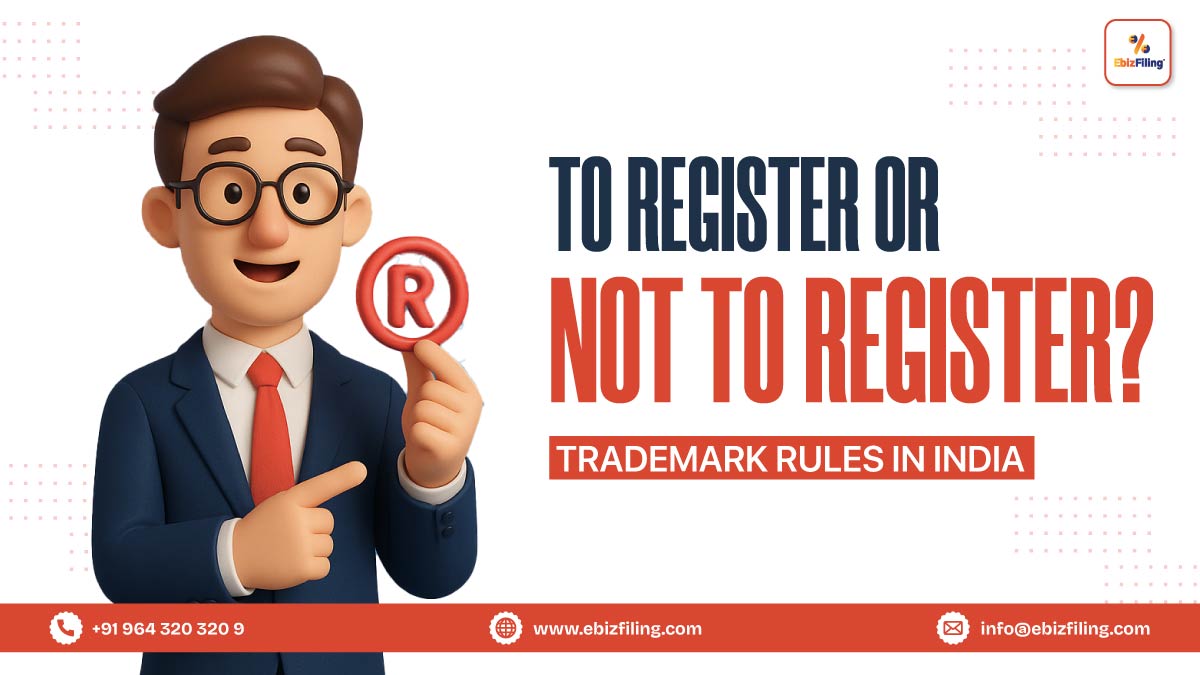
-
September 8, 2025
Compulsory Trademark Registration in India: Is It Mandatory
Introduction
In today’s competitive market, protecting your brand is crucial. While Compulsory Trademark Registration is not legally required in India, registering your trademark is strongly recommended. It safeguards your brand identity, builds trust, and adds long-term value. Though not mandatory, voluntary trademark registration is a smart move for any serious business.
What is a Trademark?
A trademark is a symbol, word, phrase, design, or a combination of these elements that uniquely identifies and distinguishes the goods or services of one party from others.
In India, trademarks are governed by the Trade Marks Act, 1999. A registered trademark gives the owner exclusive legal rights to use the mark and take legal action against infringement.
Is Trademark Registration Legally Mandatory in India?
No, under Indian law, it is not mandatory to register a trademark. You can start and operate a business using a brand name without registering it.
However, unregistered trademarks are only protected under common law rights (based on usage), and enforcing those rights can be difficult. Registered trademarks offer statutory protection under the Trade Marks Act and are far easier to enforce.
Legal Status of Unregistered Trademarks
An unregistered trademark may still be protected through Section 27 of the Trade Marks Act, which allows the owner to take legal action for passing off. This protects the goodwill of a brand when someone misrepresents their products as yours.
However, a passing off suit requires the owner to prove:
- Established reputation of the brand
- Misrepresentation by the other party
- Damage caused due to misrepresentation
Benefits of Trademark Registration in India
- Exclusive Rights: Once registered, the trademark owner has exclusive rights to use the mark in connection with the goods or services listed in the application. This is enforceable across all of India.
- Legal Protection Against Infringement: If someone uses your registered mark (or a confusingly similar one), you can take direct legal action under the Trade Marks Act. This includes injunctions, damages, and seizure of infringing goods.
- Brand Value & Goodwill: Registered trademarks create intangible business assets. They add value to your brand, increase customer trust, and can be licensed or franchised.
- Deterrent Against Copycats: Using the ® symbol sends a clear message: your brand is protected. It acts as a deterrent to potential infringers and dishonest competitors.
- Global Expansion: If you plan to register your brand in other countries, Indian registration can serve as a base for applying internationally through the Madrid Protocol.
Risks of Not Registering Your Trademark
- Risk of Brand Theft: Someone else could register the same or similar brand name before you. In that case, you may lose the right to use your own brand or face legal challenges.
- Weak Legal Standing: Proving brand ownership without a trademark certificate is difficult in court, especially if your brand isn’t widely known.
- Loss of Business Identity: Without protection, your brand could be used by others, leading to confusion among customers and a dilution of brand identity.
- Limited Investor Confidence: Investors look for brands with legal clarity. A registered trademark shows that your business is serious about protecting its assets.
Who Should Register a Trademark in India?
Trademark registration is beneficial for:
- Startups and small businesses launching a new product or brand
- Established companies looking to expand
- Online brands, influencers, and digital creators
- Exporters and businesses eyeing global markets
- Franchises or companies intending to license their brand
Trademark Registration: The Process in India
- Trademark Search: Check for existing similar trademarks using the IP India online database to avoid conflicts.
- Application Filing: File your application with the Registrar of Trademarks under an individual, company, LLP, trust, or society name.
- Examination: The registrar examines your application for conflicts or discrepancies.
- Publication in the Journal: If accepted, it’s published in the Trademark Journal to allow third parties to oppose it.
- Registration Certificate: If no opposition is filed, or if opposition is resolved, the trademark is registered, and you receive a certificate of registration, allowing you to use the ® symbol.
Incentives for Trademark Registration in India
| Sr No | Incentive | Brief Explanation |
|---|---|---|
| 1 | Exclusive Legal Rights | Grants you sole rights to use the brand name across India. |
| 2 | Strong Legal Protection | Enables easy legal action against misuse or infringement. |
| 3 | Brand Trust & Recognition | Builds customer confidence and brand credibility. |
| 4 | Business Asset Creation | Becomes a valuable intangible asset for licensing or resale. |
| 5 | Boosts Market & Investor Value | Enhances business valuation during funding or expansion. |
| 6 | Global Expansion Support | Eases international registration under the Madrid Protocol. |
What Happens If Someone Else Registers Your Brand Name First?
If someone registers a name that you have been using without registration:
- You may have to fight a legal battle to retain the right to your name.
- Courts will require strong evidence of prior use and goodwill.
- If you lose, you may have to rebrand, which is expensive and affects customer loyalty.
Can I Use ™ Without Registration?
Yes! The ™ (trademark) symbol can be used for unregistered marks to indicate that the brand owner is claiming rights over it.
However, it does not provide legal protection like a registered trademark does. Only a registered trademark can use the ® (registered trademark) symbol in India.
Conclusion
Compulsory Trademark Registration may not be legally required in India, but in practice, it’s highly advisable. A registered trademark ensures legal protection, brand exclusivity, and market credibility. While unregistered marks rely on the weaker passing off route, registration is a smart, low cost way to secure your brand in today’s fast-paced business world.
Suggested Read :
What is Passing Off Trademark?
International Trademark Assignment
Types of Trademark Assignments
Trademark Clearance Certificate
Benefits of Trademark Class System
FAQs
1. Is trademark registration mandatory in India?
No, it’s not legally mandatory, but it is highly recommended to protect your brand from misuse and infringement.
2. Can I sue someone for using my brand if I haven't registered the trademark?
Yes, but only under “passing off” laws. It’s harder to prove and provides weaker protection than a registered trademark.
3. Is using the ™ symbol legal without registration?
Yes, you can use ™ to show you’re claiming a mark, but it doesn’t offer legal rights unless the mark is registered.
4. How long is a registered trademark valid in India?
A trademark is valid for 10 years from the date of application and can be renewed indefinitely every 10 years.
5. Can a foreign business register a trademark in India?
Yes, foreign businesses can apply through agents or attorneys in India and also via the Madrid Protocol if applicable.
Trademarl Registration
Register your trademark in simple steps with Ebizfiling
About Ebizfiling -










January 30, 2026 By Dhruvi D
Trademark Registration and Renewal in the USA: A Complete Guide Introduction Many business owners believe that once a trademark is registered in the USA, it is protected forever. In reality, trademark registration is not a one-time task. In the United […]
September 10, 2025 By Dhruvi D
Can we apply for Logo and Wordmark Registration in Single Application? Introduction Businesses often wonder whether they can register both their logo and wordmark in one trademark application to save costs and simplify the process. Under Indian Trademark Law, it […]
September 10, 2025 By Dhruvi D
Can I Use Different Colour Combinations After Applying Logo as a TM Application? Introduction When it comes to protecting your brand identity, every detail matters, including the colours in your logo. Many business owners are curious if they can change […]